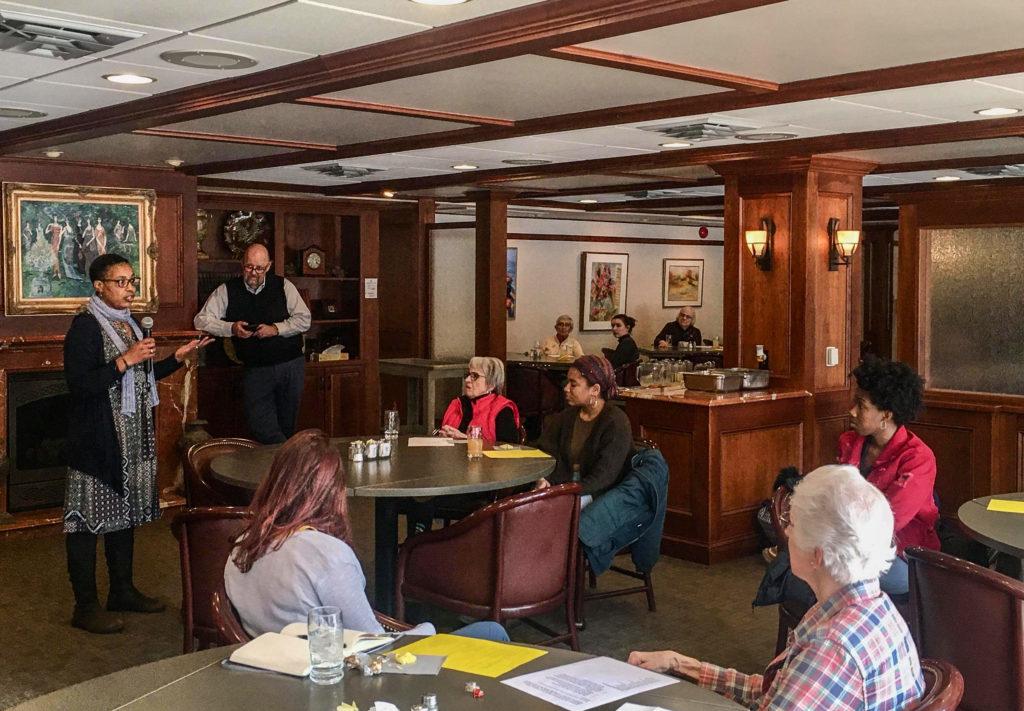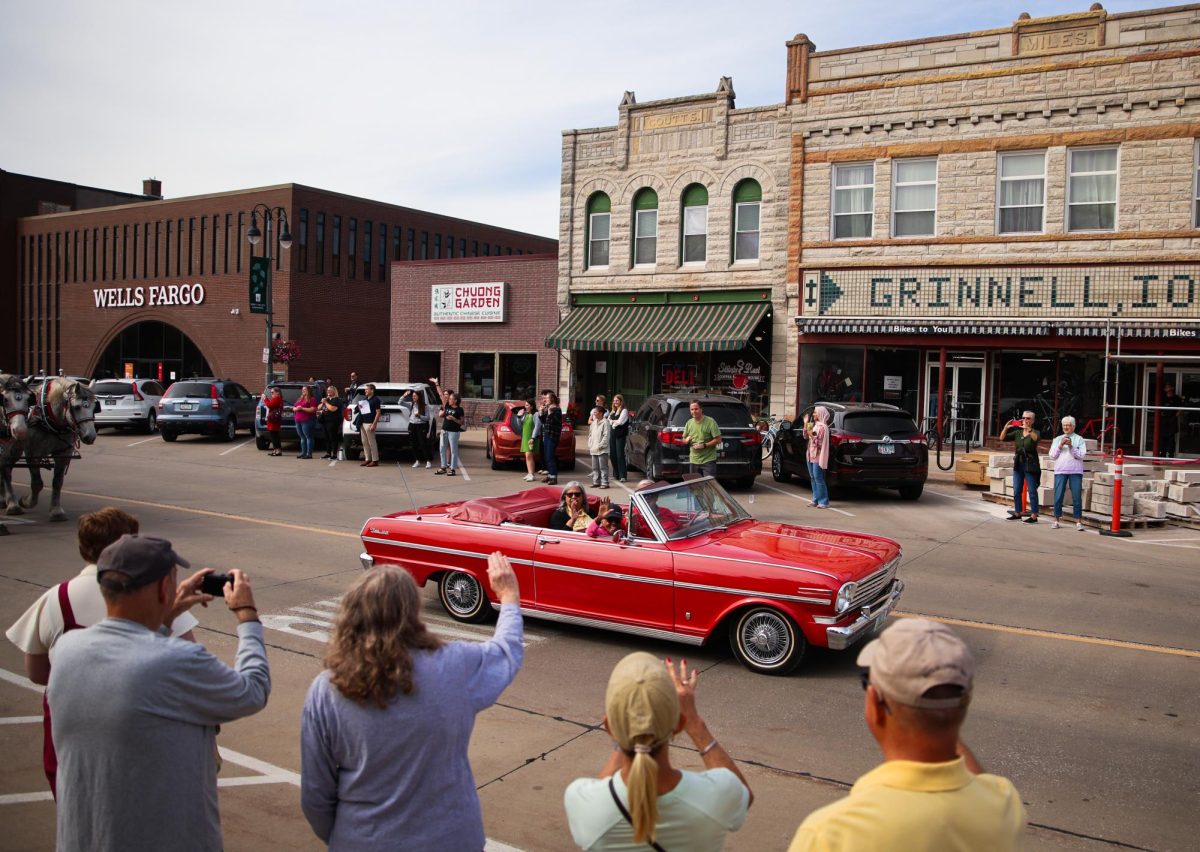Students in “Educating Women,” a GWSS course taught by Professor Tamara Beauboeuf, hopped off the shuttle at Mayflower Community recently to spend the afternoon chatting with women at the senior living community about their college experiences. At 2 p.m. on Thursday, Feb. 27, two generations of women spent a few hours mingling over juice and Lindor chocolate balls, exchanging stories of college life, then and now.
The event was held in an elegant dining room at the Mayflower. In the spirit of a “speed dating” event, students switched tables every 15 minutes to hear another woman’s story about her path to getting an education in the mid-20th century, and the social and academic joys and challenges she experienced.
“Educating Women” is an interdisciplinary exploration of women’s roles and experiences in education over the past 125 years. Before coming to Grinnell, Beauboeuf — or as her students call her affectionately, Dr. B — spent 20 years at DePauw University in Indiana. Thursday’s activity was based on an activity Beauboeuf did with her students at DePauw. For them, talking to older women was “a good opportunity for students to get a longer, more historical view on education … so we don’t take our access for granted.”
The women at Mayflower certainly haven’t taken theirs for granted. Anne Sunday, coordinator of independent living events said every woman she invited to the event was eager to participate. “Education is something people get really excited about [at Mayflower]. They come as lifelong learners,” said Sunday.
Within the “Silent Generation,” which includes people in their 70s and 80s, only 9 percent of women had graduated from college in 1965, compared to 15 percent of men, according to data from the Pew Research Center. “The coeducation of higher ed was seen as a dangerous experiment,” Beauboeuf said. Today, women outnumber men on college campuses.
Beauboeuf stressed that this progress hasn’t been universal. “We have to examine what we’re talking about when we talk about women,” said Beauboeuf. Women who are first-generation college students, women of color, non-binary students and other underrepresented groups still face barriers to belonging at colleges and universities. As Beauboeuf put it, just because women dominate, “the experiences of pioneering generations still apply for students today.”
According to Beauboeuf, this exclusion seeps into all realms of college life, from lack of representation in STEM disciplines to beauty standards and access to campus spaces. “Homogeneity is intentional,” she said. “I want students to realize that history is written in those everyday acts of inclusion or exclusion … There are women who still feel that they need to insist on their right to be on campus. … If [students] are feeling comfort, that’s a luxury.”
Back at the dining room tables, the Mayflower women shared stories about some of the ways women’s college experiences have changed since the 1950s, 60s and 70s. Deb Van Arkle, who graduated from Iowa State in 1973 told Audrey Doss ’22 about classmates that snuck men into gender-segregated dorms after curfew and the more conservative culture of drugs and alcohol during her time as a student in Ames. On her educational experience as a whole, Van Arkle stressed the importance of seeking out education throughout life. “Education has given me a belief in lifelong, informal education experiences,” she said.
Jean Libbey, who graduated from Iowa State in 1953, said that during her time at university, women weren’t expected to aspire to a career. “It was an era when women stayed home if they were married,” she said. “I was encouraged to get a degree so if my husband died I would have a job to fall back on.” But the leadership skills she gained have stuck with her through the decades. “It’s never lost, your education.”
Both women felt that racial diversity on campus in their college days was lacking, but they said that meeting people with different backgrounds was one the most important parts of their college experiences.
After almost two hours of reminiscing and connecting, the students and residents gathered to reflect on the experience. “I had to go back 70 years, so thank you for the digging opportunity,” said one Mayflower resident. A student remarked, “I was pretty impressed with how many of the women met their significant others in college.”
The class talked about the value of sharing lived experiences and engaging with different forms of knowledge outside of the classroom. In an email to The S&B, student attendee Grace Wallace ’22 said “Sometimes a class about the historical struggles of women in education can be intensely interesting but can leave me exhausted, so going to the Mayflower and talking to people with so much wisdom and excitement about education was very refreshing.” For Mayflower resident Katherine McClellan, Oberlin College Class of ’69, was reminded of how her own views on women’s belonging in higher education have changed. Looking back, McClellan remarked, it seems easy to get angry about the opportunities that were denied to entire generations of ambitious women, but that anger was not necessarily felt by women at the time.
“All of us went to school before the women’s movement. … I needed that societal framework in order to see some of the issues that were being talked about,” she said. “I didn’t think many of us would’ve thought about that as the way things were.”
The conversations may have been quick, but women across generations reflected on the value of higher education and the importance of continuing to create inclusive spaces on college campuses. Dr. Beauboeuf wrapped up the discussion with a quote from the former president of DePauw University: “The task of college is to keep your world as big as possible.”




















































